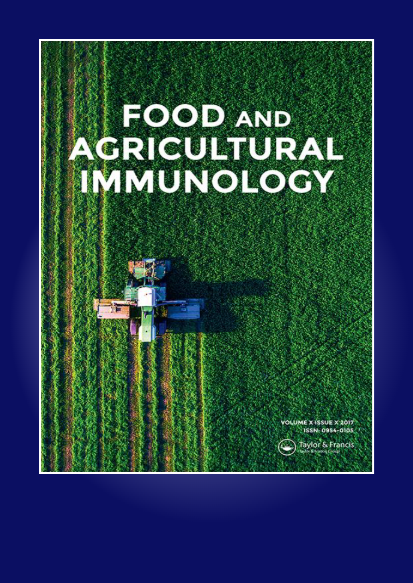Immunomodulation of RAW264.7 cells by CP80-1, a polysaccharide of Cordyceps cicadae, via Dectin-1/Syk/NF-κB signaling pathway
IF 2.1
3区 农林科学
Q3 CHEMISTRY, APPLIED
引用次数: 0
Abstract
ABSTRACT Cordyceps cicadae is a rare edible and medicinal entomogenous fungus. Here, the structural characteristics and immunomodulatory activity of C. cicadae polysaccharide CP80-1 were preliminarily elucidated. It showed that CP80-1 of 250.431 kDa was mainly composed of glucose, xylose and rhamnose. Physiologically, CP80-1 can regulate the immune of RAW264.7 cells by promoting the proliferation, phagocytosis, and secretion of nitric oxide (NO), tumor necrosis factor (TNF)-α, interleukin (IL)−1β, and interleukin (IL)−6. However, these effects were significantly attenuated when Dectin-1 receptor expression was inhibited by laminarin. Moreover, laminarin down-regulated the mRNA levels of relevant genes, inhibited CP80-1-driven expression of proteins related to spleen tyrosine kinase (Syk) and nuclear factor kappa-B (NF-κB) signaling pathway. Additionally, CP80-1 induced the nuclear translocation of NF-κB subunit p65 in RAW264.7 cells. These results suggest that CP80-1 may activate RAW264.7 cells by regulating the Dectin-1/Syk/NF-κB signaling pathway, which provides theoretical basis for the development of C. cicadae in immunomodulation.蝉虫草多糖CP80-1通过Dectin-1/Syk/NF-κB信号通路对RAW264.7细胞的免疫调节
本文章由计算机程序翻译,如有差异,请以英文原文为准。
求助全文
约1分钟内获得全文
求助全文
来源期刊

Food and Agricultural Immunology
农林科学-毒理学
CiteScore
5.30
自引率
6.70%
发文量
52
审稿时长
2 months
期刊介绍:
Food and Agricultural Immunology is an international open access journal publishing original immunological research with applications in food, agricultural, environmental and veterinary science. Submissions describing the use of immunological techniques and methods are particularly welcomed.
The journal aims to expand our understanding of the interactions at the interface of food and immune systems including studies on:
-Development of diagnostic systems – all types of ligand-based assays, e.g. antibody, aptamer
-Application of ligand-based assays for the detection or identification of molecules of interest in food science, agricultural research, veterinary investigations and clinical systems relating to food allergy or sensitivity to agricultural chemicals
-Effects of food on the immune system
-Studies on allergy and allergic reactions
-Investigations into food allergies
-Development of allergen-free food systems
-Development of novel assay formats
-Applications of assay systems to the monitoring of food items in relation to safety and labelling
-Food quality issues, e.g. speciation, adulteration and contamination
-Comparisons between different analytical techniques
The journal publishes research and review articles and is essential reading for food scientists, immunologists and all those concerned with the interaction between food and immune systems.
 求助内容:
求助内容: 应助结果提醒方式:
应助结果提醒方式:


